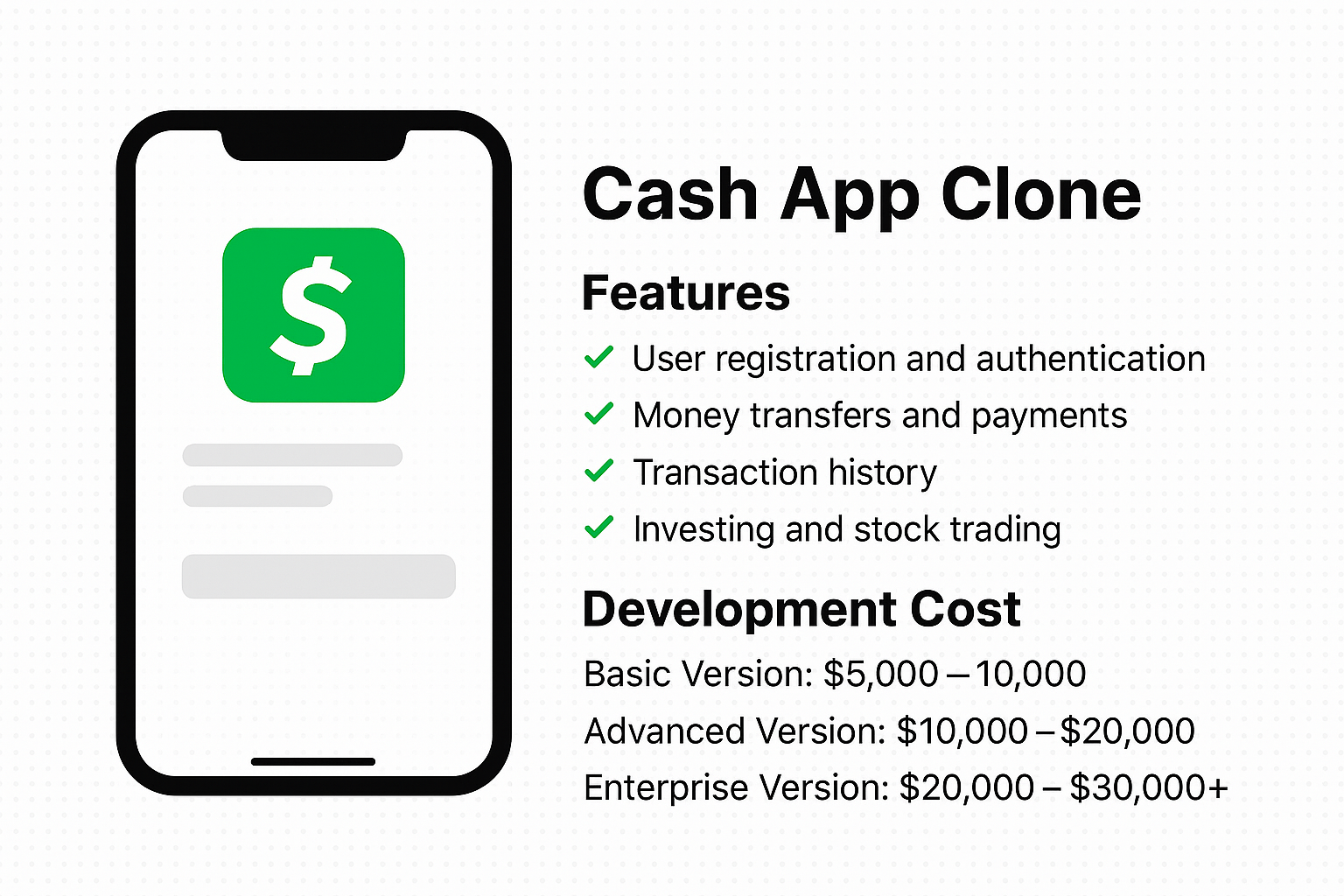The digital payment industry has seen unprecedented growth in recent years, with applications like Cash App revolutionizing the way people transfer money, invest, and manage their finances. For entrepreneurs and startups looking to enter this lucrative market, creating a Cash App clone is an attractive option. This article provides a comprehensive guide to developing a Cash App clone, including essential features, development costs, and step-by-step development strategies.
Understanding the Concept of a Cash App Clone
A Cash App clone is a ready-made or custom-built application that replicates the core functionalities of Cash App. The goal of creating such a clone is to offer users an easy-to-use platform for money transfers, bill payments, mobile recharges, and investments. Utilizing a cash App clone script significantly reduces the development time and cost, allowing startups to quickly launch a competitive product in the market.
A cash App clone provides similar features and functionalities to the original Cash App, but with the flexibility to incorporate unique elements tailored to the target audience. Businesses can modify UI/UX, integrate new services, and implement advanced security measures while maintaining the core framework of the clone app.
Key Features to Include in a Cash App Clone
To ensure the success of a Cash App clone, it is essential to integrate all the fundamental features that users expect from a modern digital wallet. Here are the key features to consider:
1. User Registration and Authentication
Secure and seamless user registration is the foundation of any financial application. Incorporating multiple sign-up options, such as email, phone number, or social media accounts, enhances user convenience. Two-factor authentication (2FA) ensures added security against unauthorized access.
2. Money Transfer and Payments
The primary function of a Cash App clone is instant money transfers. Users should be able to send and receive money using mobile numbers, email addresses, or unique QR codes. Integration with bank accounts, debit/credit cards, and digital wallets enhances versatility.
3. Transaction History and Notifications
A detailed transaction history enables users to track payments and manage their finances efficiently. Real-time push notifications about successful transactions, pending payments, or offers improve user engagement and transparency.
4. Bill Payments and Mobile Recharge
Expanding the app’s utility by allowing bill payments (electricity, water, internet) and mobile recharges makes the platform more appealing. These features attract a broader user base seeking convenience in handling multiple financial tasks from one app.
5. Investing and Stock Trading
Many users are attracted to Cash App for its investment options. A robust Cash App clone can include features like fractional stock trading, cryptocurrency investments, and savings plans. This feature differentiates the app from basic peer-to-peer payment platforms.
6. Security and Compliance
Ensuring compliance with financial regulations such as KYC (Know Your Customer) and AML (Anti-Money Laundering) is mandatory. Incorporating end-to-end encryption, biometric authentication, and fraud detection mechanisms safeguards sensitive user data.
7. Customer Support
An integrated support system with chatbots, FAQs, and live support ensures that users receive timely assistance. This improves user trust and retention.
Choosing the Right Cash App Clone Script
A cash App clone script acts as the base framework for developing your app. Choosing a reliable and scalable script is crucial for smooth performance and future updates. Look for scripts that offer:
- Customizable features and UI/UX
- Cross-platform compatibility (iOS and Android)
- Secure payment gateway integrations
- Pre-built modules for faster development
- Support for multiple languages and currencies
Using a high-quality cash App clone script reduces development time significantly and ensures that the app meets industry standards.
Step-by-Step Guide to Developing a Cash App Clone
Developing a Cash App clone involves multiple stages, from conceptualization to deployment. Here’s a detailed guide:
1. Market Research and Analysis
Understand your target audience, competitors, and market trends. Identify features that are missing in current digital wallets to create a unique value proposition.
2. Choose the Technology Stack
Select a robust tech stack for front-end and back-end development. Popular choices include:
- Front-end: React Native, Flutter
- Back-end: Node.js, Python, Ruby on Rails
- Database: MySQL, MongoDB
- Cloud Services: AWS, Google Cloud
- Payment Gateways: Stripe, PayPal, Plaid
3. Design UI/UX
The app should have an intuitive and user-friendly interface. Prioritize simplicity, ease of navigation, and accessibility across devices. A visually appealing and smooth interface encourages user adoption.
4. Development and Integration
Develop front-end and back-end components and integrate essential features like money transfer, bill payments, and investments. Ensure seamless integration with secure payment gateways and banking APIs.
5. Security Implementation
Implement high-level security protocols such as encryption, tokenization, and two-factor authentication. Regular security audits help prevent data breaches and maintain compliance with financial regulations.
6. Testing and Quality Assurance
Conduct thorough testing, including functional, performance, and security tests. Fix bugs, improve app speed, and optimize the overall user experience.
7. Deployment and Launch
Deploy the app on iOS and Android platforms. Monitor user feedback and analytics to identify areas for improvement and future updates.
Cash App Clone Development Cost
The cost of developing a Cash App clone varies depending on multiple factors such as complexity, platform, features, and development team location. Here is a detailed breakdown:
- Basic Version: $5,000 to $10,000
Includes essential features like money transfer, transaction history, user registration, and basic UI/UX design. - Advanced Version: $10,000 to $20,000
Includes additional features such as bill payments, mobile recharge, investments, and enhanced security protocols. - Enterprise Version: $20,000 to $30,000+
Full-fledged app with advanced analytics, AI-driven recommendations, multi-currency support, and extensive scalability.
Using a ready-made cash App clone script can further reduce costs and development time by up to 40%.
Marketing Your Cash App Clone
Launching the app is only the beginning. Effective marketing strategies are crucial for user acquisition and retention:
- Social Media Campaigns: Promote your app across platforms like Instagram, Twitter, and LinkedIn.
- Referral Programs: Encourage users to invite friends and earn rewards.
- Content Marketing: Educate potential users through blogs, videos, and tutorials.
- App Store Optimization: Ensure high visibility in app stores through optimized descriptions and keywords.
Conclusion
Creating a Cash App clone is a promising venture in the growing digital payment industry. By focusing on essential features, security, and user experience, businesses can launch a successful app that meets the needs of modern users. Choosing the right cash App clone script and investing in a scalable and secure infrastructure ensures that your app stays competitive in the long run. Proper planning, development, and marketing strategies are the keys to building a thriving Cash App clone.
Frequently Asked Questions (FAQs)
1. What is a Cash App clone?
A Cash App clone is an app that replicates the features and functionalities of Cash App, allowing users to transfer money, make payments, and invest.
2. How much does it cost to develop a Cash App clone?
The cost varies depending on features and complexity. Basic apps start from $5,000, while advanced versions can exceed $30,000.
3. What is the role of a Cash App clone script?
A cash App clone script provides a ready-made framework for developing the app, reducing development time and costs.
4. Can I add custom features to my Cash App clone?
Yes, a clone app can be customized with additional features like bill payments, cryptocurrency investments, and AI-powered recommendations.
5. How long does it take to develop a Cash App clone?
Typically, it takes 3 to 6 months, depending on complexity, features, and team efficiency.



